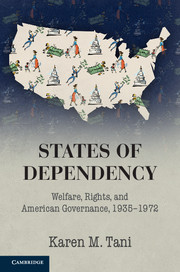Book contents
- Frontmatter
- Dedication
- Contents
- List of figures and tables
- List of gallery images
- Acknowledgments
- Introduction
- PART I 1935 TO 1949
- PART II 1950 TO 1972
- 5 States’ Rights against Federal Administrative Enforcement: Contesting Dependency
- 6 Rights against the State(s): Questioning Rehabilitation, Resisting Restriction
- 7 Welfare Rights outside the Courts: The Administrative Origins of Poverty Law
- 8 Subjects of the Constitution, Slaves to Statutes: The Judicial Articulation of Welfare Rights
- Conclusion
- Notes
- Selected Bibliography of Primary Sources
- Index
- Plate section
5 - States’ Rights against Federal Administrative Enforcement: Contesting Dependency
from PART II - 1950 TO 1972
Published online by Cambridge University Press: 05 April 2016
- Frontmatter
- Dedication
- Contents
- List of figures and tables
- List of gallery images
- Acknowledgments
- Introduction
- PART I 1935 TO 1949
- PART II 1950 TO 1972
- 5 States’ Rights against Federal Administrative Enforcement: Contesting Dependency
- 6 Rights against the State(s): Questioning Rehabilitation, Resisting Restriction
- 7 Welfare Rights outside the Courts: The Administrative Origins of Poverty Law
- 8 Subjects of the Constitution, Slaves to Statutes: The Judicial Articulation of Welfare Rights
- Conclusion
- Notes
- Selected Bibliography of Primary Sources
- Index
- Plate section
Summary
In the fall of 1938, the two-year-old Indiana State Department of Public Welfare was filled with optimism. Staff of the department's new division for information and public relations had launched a massive campaign of “interpretation” to explain the department's good work, logging some sixty thousand miles within the state in a single year (“twice around the world and more than a third of the way ’round again!” boasted the department newsletter). Through films and radio scripts, exhibits at county fairs, “literature kits” given out to interested groups, and carefully produced “human interest” stories designed for local newspapers, department employees cheerfully spread the word.
Just twelve years later, in 1950, the outlook was much darker. Despite the department's earnest “Know Your Welfare Program” slideshow, despite its stated commitment to “building windows and turning on lights so that everyone … can see and know what we are doing,” public welfare in Indiana was under siege. The charge, ironically, was that the Public Welfare Department had concealed its operations from public view, and forced local welfare agencies to do the same, by requiring that the identities of public assistance recipients be kept confidential. Conservative state politicians, aided by powerful allies in the local media, conjured images of liberal bureaucrats frittering away taxpayer dollars behind an “iron curtain of secrecy,” a convenient and evocative Cold War reference. Hiding behind the principle of client confidentiality, these critics alleged, the department had encouraged welfare fraud, aided socialism, and attempted to build a behemoth centralized bureaucracy. When the department countered that it was simply obeying an established requirement of the Social Security Act – on which Indiana's generous federal assistance grants hinged – critics took the fight to Washington. There they confronted federal welfare administrators and, when stymied, convinced Congress to nullify the offending provision of federal law.
This bit of political maneuvering stands in stark contrast to how such actors had resolved their differences in the past. And it was not an isolated incident. Around the same time, officials in Arizona and New York also rebelled against federal administrative authority. Following Indiana's challenge to federal mandates, Arizona sued federal administrators for refusing to tolerate the state's long-running discrimination against American Indian public assistance claimants – discrimination, not coincidentally, that federal administrators helped expose in the 1940s.
- Type
- Chapter
- Information
- States of DependencyWelfare, Rights, and American Governance, 1935–1972, pp. 155 - 188Publisher: Cambridge University PressPrint publication year: 2016



